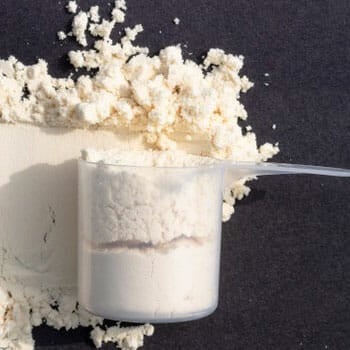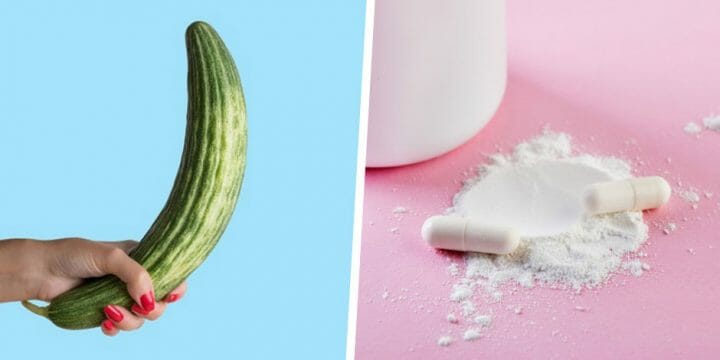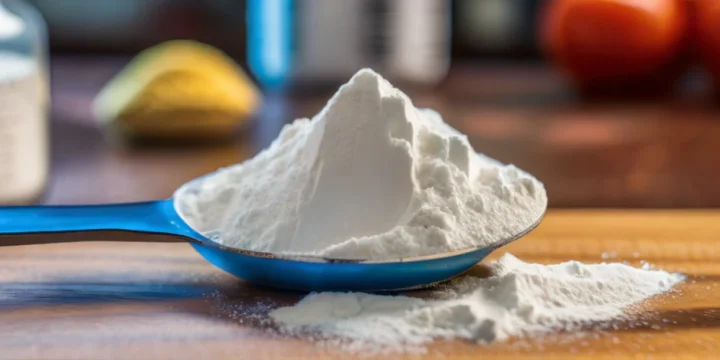As an experienced personal trainer, a common question I encounter from clients is about the safety and effectiveness of mixing creatine with whey protein.
To address this query and provide clear guidance, I've crafted this article detailing the optimal mix ratio of these two popular supplements based on what has worked for me and my clients.
This piece is designed to demystify the combination of creatine and whey protein, ensuring you can confidently integrate both into your fitness regimen for maximum benefit.
Let's dive in
Quick Summary
- You can mix creatine with whey protein, provided you don't exceed the recommended dosages for both supplements.
- Mixing creatine with whey protein enhances muscle endurance, power, and strength.
- To get the most out of both products, take one scoop (around 32g) of whey protein powder and 5g of creatine together once a day after exercising.
- Based on my observations, regular intake of whey protein and creatine mixture can increase muscle mass and enhance an individual's performance.
Is Mixing Creatine With Protein Supplements Safe?

Mixing creatine with protein supplements is safe. It is actually convenient and beneficial to do so.
Many of my clients have reported improved strength and endurance after starting this combination. It's a convenient way to get the best of both worlds.
Just make sure you don’t exceed the recommended intake per day and be aware of how they may interact with other supplements and medications you’re taking.
It's important to note that while some individuals may experience initial bloating or discomfort, these symptoms typically subside as the body adjusts to the new supplement regimen.
“When used orally at appropriate doses, creatine is likely safe to take for up to five years. However, there is concern that creatine taken in high doses is possibly unsafe and could damage the liver, kidneys or heart.”
-Mayo Clinic
That’s why it’s always wise to seek professional medical advice first, especially for long-term use.

The Benefits of Mixing Protein and Creatine

In my years of training clients, I've consistently recommended creatine monohydrate. It's not only safe and effective but also affordable. And here’s why you should mix it with your protein.
1. Enhances Muscle Endurance, Strength, and Power.
From my experience, the role of phosphocreatine in converting to ATP is crucial for muscle contractions. I've seen clients who supplement with creatine experience a noticeable boost in their workout intensity, thanks to this enhanced energy source. It produces strong contractions needed for high-intensity movements such as weight lifting and jumping.
2. Provides Quick Energy Bursts and Greater Strength.
According to studies in the National Institutes of Health, it also provides you with enough energy during short-burst high-intensity endurance, and resistance training like lifting heavy weights, sprinting, and similar types of activities [1].
However, besides providing quick energy bursts and greater strength, reports available in the National Library of Medicine show that creatine doesn’t prevent muscle damage [2]. And that’s where a top-quality whey protein supplement comes into play.
3. Enhances Tissue Repair and Recovery.

As a personal trainer, I've seen many bodybuilders and athletes benefit greatly from whey protein shakes. That's because whey proteins get absorbed quickly and are metabolized directly into your muscle tissue, as per studies published in the National Library of Medicine [3].
More importantly, a whey protein supplement provides your body with Leucine and other valuable branched-chain amino acids (BCAA).
These building blocks of proteins promote muscle protein synthesis and tissue repair and maximize muscle growth and exercise performance.
They prevent muscle strain and enhance the recovery process after exhaustive resistance training, as per studies published in the National Institutes of Health [4] [5].
4. Increases Muscle Mass and Enhances Performance.
When used in combination, your body can absorb more creatine than when used separately, plus it utilizes less sugar to transport creatine to your muscles, supporting a low-carb diet regimen as per reports in the National Institutes of Health [6].
Additional studies published in the Journal of Applied Physiology show that creatine reduces the oxidation of Leucine, an essential BCAA you get from whey protein supplementation to improve muscle protein synthesis, prevent short-term muscle loss, and support the long-term muscle-building process effectively [7].
Now you have the necessary information on the safety, differences, functions, and benefits of both supplements, including the scientific evidence behind each fact.
Let’s get to another relevant point - ways to use them both in combination to increase muscle mass and achieve your other goals in the gym.
Related Articles:
When Is the Best Time to Take Them?

The best time to take protein and creatine is after your workouts according to various studies in the National Library of Medicine [8] [9] [10].
The ideal time frame for maximized benefits may be within 30 minutes after finishing your workout when your “starving” muscles are most receptive to the nutrients. However, individual routines and goals may dictate different timing for maximum benefits.
As an experienced trainer, I usually advise adding some sort of carbs to increase your body’s ability to uptake creatine and further boost your muscle tissue recovery.
Additionally, combined with protein, fast-digesting simple sugars like cyclic dextrose can give your body rapid replenishment. That’s because your muscles absorb the amino acids and sugars better post-exercise when your glycogen levels are low, and insulin levels are high.
How to Combine Them for Maximum Gains

Research Gate studies suggest starting with 0.3g of creatine per kg of body weight daily for a week, then maintaining with 3-5g daily to keep creatine levels high in muscles [11]. The National Institutes of Health recommends about 20-25g of protein daily, or 1.6g/kg (0.73g/lbs), for muscle gains in young adults [12].
Loading up on creatine initially is like boosting your muscle's energy reserves for better strength and performance in high-intensity exercises.
Generally, most people experience great results when mixing whey protein powder and creatine products in a 6:1 ratio.
As a trainer, I advise clients to take one scoop (about 32g) of whey protein and 5g of creatine post-exercise daily. Mix creatine with your protein shake, using plenty of water or milk for better dissolution. Vegetarians and vegans can effectively use plant-based proteins with creatine too.
For enhanced creatine absorption, I suggest adding double the amount of carbohydrates to the protein shake. This method, honed through years of experience, prepares muscles effectively for subsequent intense workouts.
FAQs
Can You Take Creatine if Your Pre-Workout Has Creatine in It?
Yes, you can take creatine even if your pre-workout has creatine in it as long as you don’t exceed the total dosage recommended per day.
Check our blog to learn more about the differences between creatine and pre-workouts.
What Should You Not Mix Creatine With?
You should not mix creatine with caffeine, alcohol, and ephedra. That is because caffeine may decrease creatine's efficacy, alcohol may cause dehydration and slow muscle recovery, and ephedra might increase the risk of stroke and other serious side effects. Also, don't mix with nonsteroidal anti-inflammatory drugs like ibuprofen as they might damage your kidneys.
What’s the Best Thing to Mix Creatine With?
The best thing to mix creatine with is healthy liquids like water, protein shake, almond or coconut milk, fresh cold-pressed juice, or a smoothie to prevent dehydration and get in all the essential nutrients.
References:
- https://www.ncbi.nlm.nih.gov/pmc/articles/PMC3407788/
- https://pubmed.ncbi.nlm.nih.gov/29722252/
- https://www.ncbi.nlm.nih.gov/pmc/articles/PMC4924180/
- https://www.ncbi.nlm.nih.gov/pmc/articles/PMC5537849/
- https://www.ncbi.nlm.nih.gov/pmc/articles/PMC5852797/
- https://www.ncbi.nlm.nih.gov/pmc/articles/PMC5469049/
- https://journals.physiology.org/doi/full/10.1152/jappl.2001.91.3.1041
- https://pubmed.ncbi.nlm.nih.gov/23919405/
- https://pubmed.ncbi.nlm.nih.gov/25993883/
- https://www.ncbi.nlm.nih.gov/pmc/articles/PMC5214805/
- https://www.researchgate.net/publication/249320351_Creatine_Supplementation
- https://www.ncbi.nlm.nih.gov/pmc/articles/PMC5537849/
About The Author
You May Also Like






